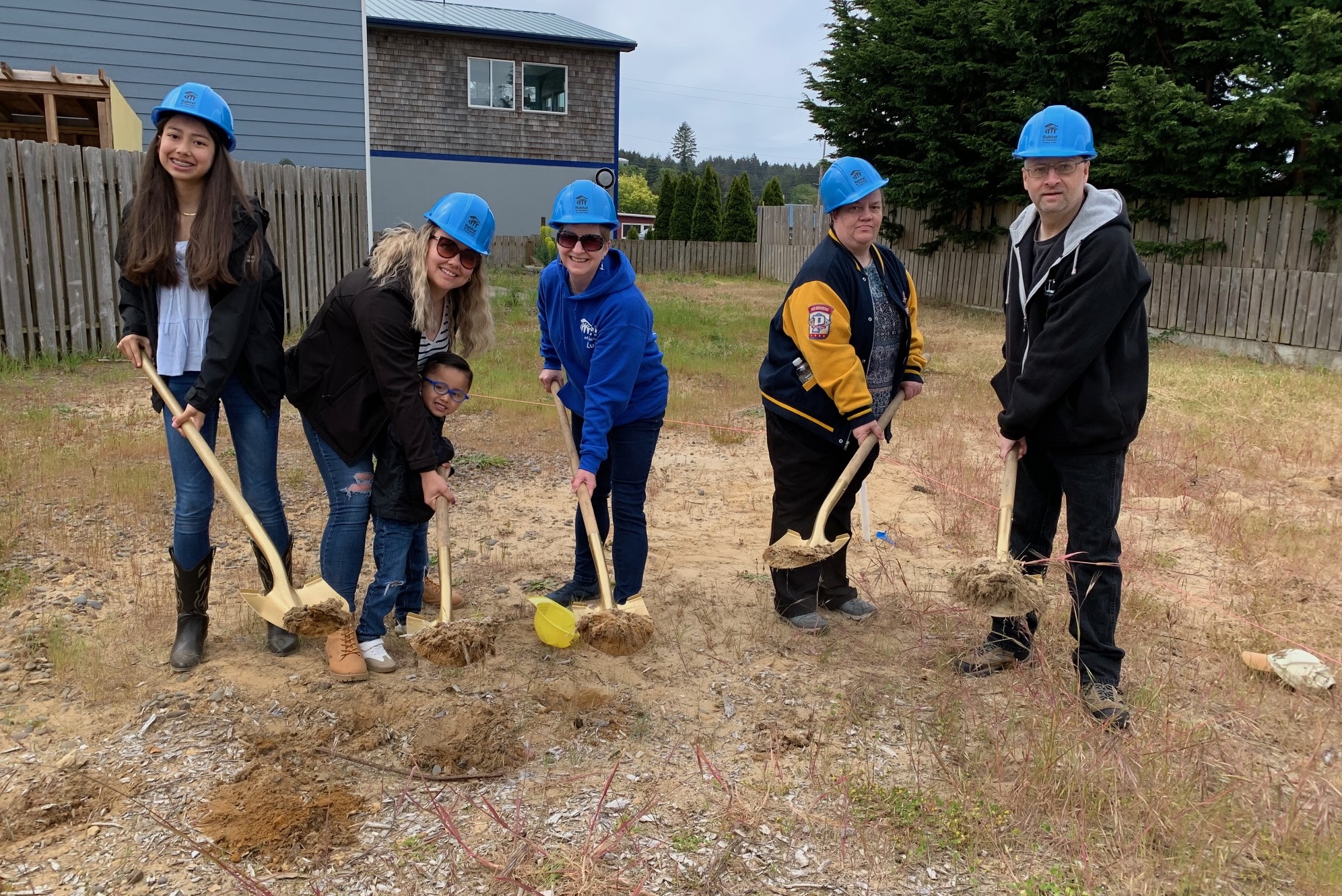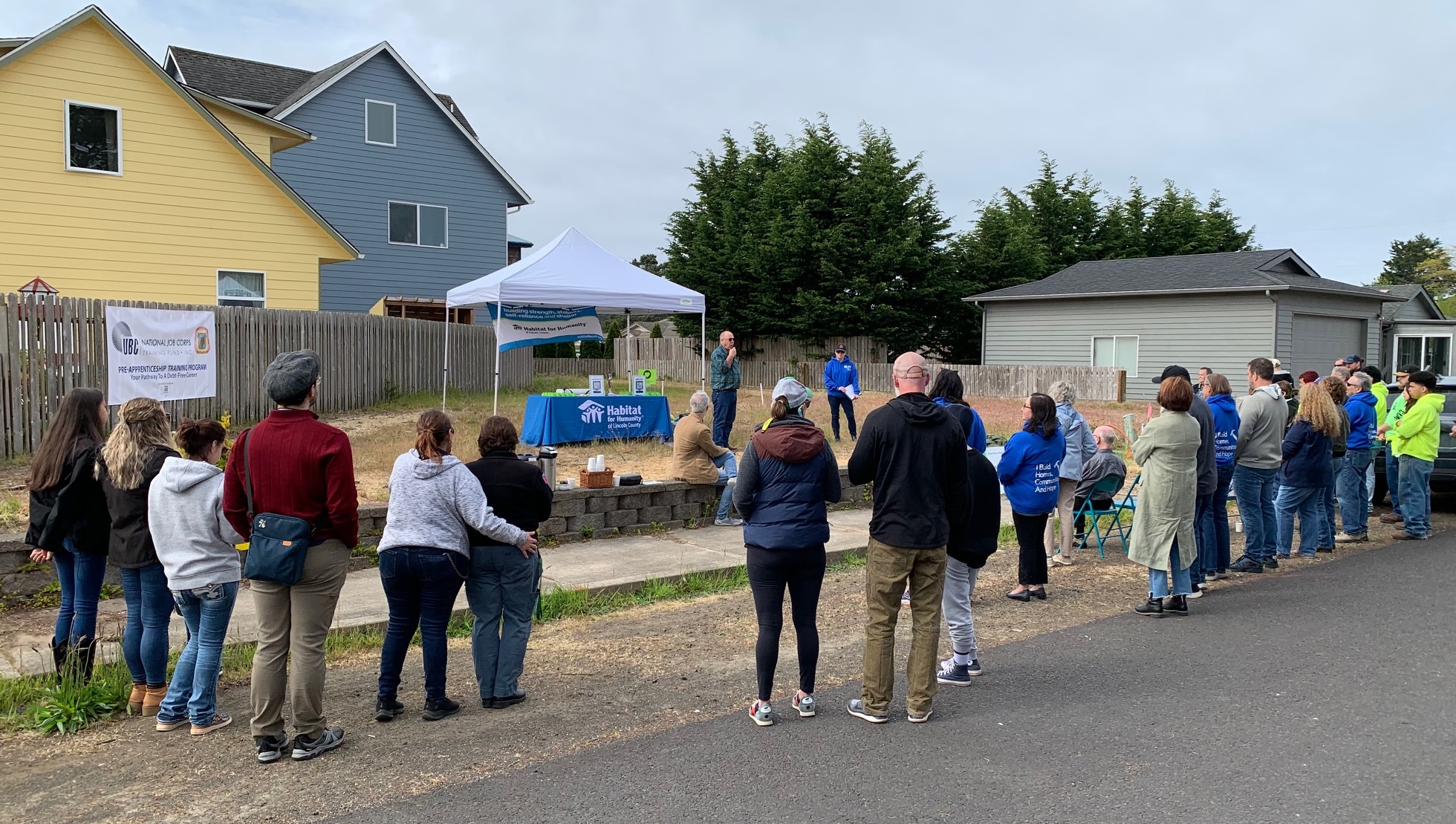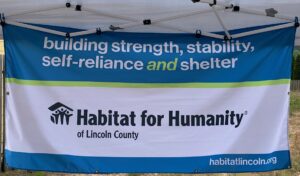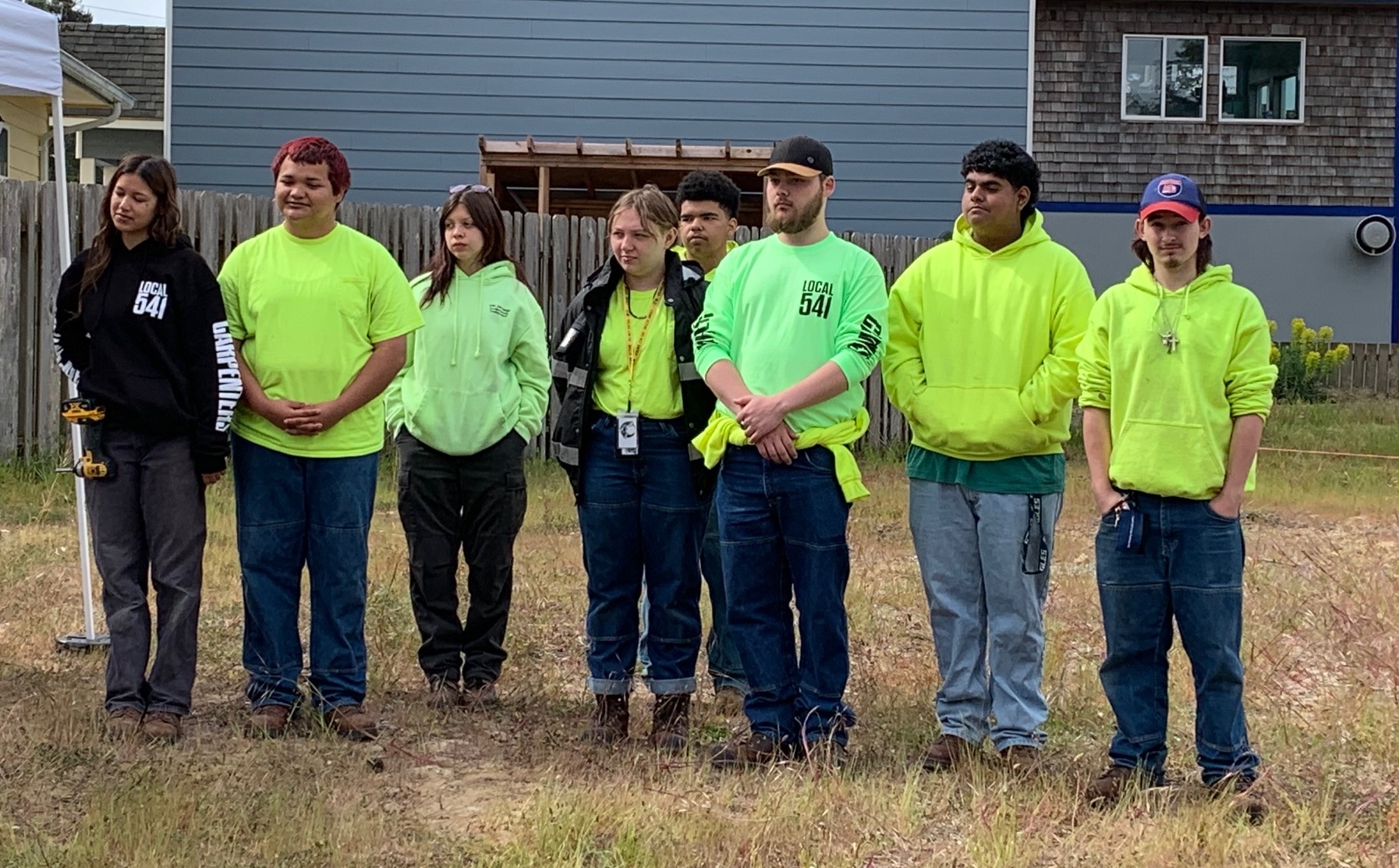
By GARRET JAROS/Lincoln Chronicle
WALDPORT — Rayna Knowlton is up early so she can catch the bus to physical therapy. She can only afford one cup of coffee, but she figures the therapy on the shoulder she injured while catching her husband, Chris, before he fell face-first into a vanity will wake her up.
Chris Knowlton has seizures and falls and does not work anymore. He used to work at Ray’s Food Place in Waldport, where the couple rent a house. They do not own a car.
Rayna Knowlton walks or takes the bus wherever she goes, including to her mom’s house in Seal Rock, where she goes after therapy to care for her youngest son who stays with his grandmother and also suffers from seizures.
Amber Albino rents an apartment in Newport. She is also up early to get ready for work and get her 11-year-old daughter and four-year-old son ready to drop off at school in Waldport before continuing on to Sea Aire Assisted Living in Yachats where she works as a nurse assistant.
Albino and the kids have moved a lot in the past two years after she separated from her son’s father. They started off in a motel. And then lived in a trailer with her mom. Then a small apartment with her mom. Their apartment now is a little bigger.
For Albino and Knowlton making ends meet is no easy feat — never mind buying a home of their own.
But that is exactly what both families are doing with the help of Habitat for Humanity of Lincoln County, which broke ground on both homes Saturday in Waldport. The two homes may just be the last stick-frame built homes by the Lincoln County chapter of Habitat as it transitions to offering modular and manufactured homes to meet the demand of low-income applicants.
“It means a lot,” Albino said. “Before I applied for the program, I was trying to build my credit because no one in my immediate family owns their own home. And I really want to own my own home. It means my kids will get to continue to go to school in Waldport like I did and we’ll have a stable home. This will be our forever home.”
Knowlton was cooking dinner at her mom’s house a little over a year ago when she received the email saying things had shifted around and although originally denied that she and her husband would now be getting a home.
“I literally had to stop cooking dinner and read the email a couple of times,” Knowlton said. “I texted my husband and said ‘We’ve got the house.’ And he said ‘You’re kidding me, aren’t you?’ And I said ‘No, I wouldn’t do that.’ I’m just grateful to be a homeowner. It’s a big dream of ours.”

Moving to manufactured homes
Habitat for Humanity of Lincoln County has sold 20 homes with affordable mortgages to income-qualified buyers since it began operating in 1995, said executive director Lucinda Taylor. If an owner chooses to sell the home in the future, Habitat is given the first opportunity to buy it back. If Habitat declines, the house can then be sold on the open market.
“And that’s true for anyone who bought prior to 2020,” Taylor said. “Since then, we’ve adopted a permanent affordability model or community land trust model, so now there are deed restrictions. We now maintain ownership of the land so they are just buying the home. So now they can only be sold to low-income households.”
The two new homes in Waldport will be built next to two Habitat homes erected between 2012 and 2014 at the corner of Northeast Commercial and Northwest Fayette streets. The homes will cost approximately $200,000 each and could take two years to build, although Taylor thinks these might go a little faster.

“It’s hard to predict how long it will take to finish building because we build with volunteers, so it can take up to two years for a home to be completed,” Taylor said. “But we think this will be shorter because we are partnering with Angell Job Corps. It could go much faster. We’d love to have them done in a year, but it probably will be 18 months.”
The reason Habitat in Lincoln County is moving toward modular and manufactured homes is to keep pace with demand.
“We can’t build fast enough with the volunteer base,” Taylor said. “We don’t have enough volunteers to build to meet the need that we have in our county. We need way more homes than we can ever build. Because one home every 18 to 20 months is not going to cut it. It’s just way too slow.”
Manufactured homes will be less expensive for the organization to provide but modular homes will cost about the same or possibly more. Codes have changed over the years and today’s manufactured homes actually hold their value and do appreciate, Taylor said.
“Not at the same rate that a site-built home will appreciate, but a lot of that has to do with peoples’ perception,” she added. “But the current standards are much, much higher. There is nothing wrong with manufactured homes, absolutely nothing. Some of the stigma is from history but also from people believing they look a certain way and saying it doesn’t fit in our community. Well, these days they can add roof lines and do things that don’t make them look like a box.”
It was a manufactured home placed in Otis for a survivor of the 2020 Echo Mountain fire that triggered the agency to consider switching from stick-built homes. Taylor tours the factories when looking where manufactured or modular homes will be built to ensure they meet high standards and to assesses the companies’ values.
A growing waitlist
Twenty-two families applied for the two homes in Waldport and Habitat has more than 100 Lincoln County families in its database who have reached out to find a home.
“So the need is great,” Taylor said.

Habitat continues to require homeowners to put “sweat equity” into helping build their homes when possible, which in a manufactured or modular home might include painting, working on trim or landscaping. A two-adult household must put in 500 hours of work and a single adult household 350 hours.
“But we do work with people to do things that match their abilities,” Taylor said. “For instance, one of the Waldport households, they really aren’t able to do work on the home, that’s something they’re just not physically going to be able to do.”
They will have the option to work at one of Habitat’s ReStores in Newport or Lincoln City, or Habitat will connect them with another local nonprofit.
Income requirements to qualify for a Habitat home vary based on family size, but in general applicants need to earn between 45 and 70 percent of the annual median income. For a family of two means a combined income on the low end of about $30,000 and at the high end just over $46,000.
Habitat’s funding has been changing the last few years and comes from a variety of sources including donations – which include the donations of homes. For the Waldport build, 90 percent of the funding is coming from a state program for local housing. But it’s unusual to get that much from the state, Taylor said.
“The last build we did in Lincoln City, approximately 50 percent of the funding came from the state,” she said. “In that build we also had a lot of money from the city of Lincoln City, which is super supportive of affordable housing.”
Habitat is currently in pre-development planning for nine to 18 homes — depending on whether they can have duplexes — in Lincoln City on land donated by Samaritan North Lincoln Hospital.

“A long wait”
Lincoln County contributed $15,000 toward the Waldport build through its economic development fund. Excavation work for the homes is expected to begin within a week of groundbreaking.
Floor plans for the homes are designed to fit individual family needs.
Albino and her children along with their cat, Lola, will be moving into a two-story, three-bedroom, 1½-bath townhome with a garage.
Rayna and Chris Knowlton along with their dog, Izzy, will live in a spacious single story one bedroom house.
“It’s been a long wait,” Rayna Knowlton said. “It was December two years ago when I heard they were opening a build. But we waited and went through hoop after hoop and meetings and planning. But it is pretty exciting. We’re in a house that needs repairs and the landlord doesn’t want to fix it so I’m just so glad to be getting this opportunity.”
- Garret Jaros covers the communities of Yachats, Waldport, south Lincoln County and natural resources issues for the Lincoln Chronicle, formerly YachatsNews, and can be reached at GJaros@YachatsNews.com





















Congratulations, Rayna, Chris, and Amber!
Nothing like the pride of home-ownership to build self-esteem.
My humble suggestion for designing a small house — try to get a modest, stackable washer-dryer, maybe through the private donors. That way, you don’t have to leave the house and you know that your washer-dryer is as clean as you keep it. Also, if your kitchen space is really small and you have kids, consider not having a built-in dishwasher — that’s what the kids are for, it’s good for them. Also, put a 24″ wide cabinet or drawer unit in the dishwasher space for more storage.
From a proud hands-on participant [kitchen and bath design, and foundation work] in a Habitat build.
All of us at Habitat for Humanity are thrilled to start this build in Waldport, my town. Please join me onsite. The sooner we get these done, the sooner we can add more to the affordable housing inventory in Lincoln County. Volunteers are always welcome. Check out our website for more information: https://www.habitatlincoln.org
I’m glad to see the Angell Crew involved. Hands-on experience is of value, and the experience develops good teamwork skills and confidence in oneself. Angell Job Corps is good for our youth, and I’m proud that Lincoln County supports Angell. Fly on, winners!
Yes, I am too. Great program and much needed across the country. I’m looking forward on working with this crew.